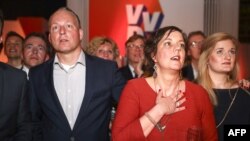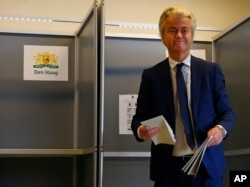Exit polls from the Netherlands election Wednesday indicated that Prime Minister Mark Rutte defeated anti-immigrant, anti-Islam nationalist Geert Wilders by a larger margin than expected.
Rutte's center-right People's Party for Freedom and Democracy was projected to win 31 seats, far more than any other party, including Wilders' Freedom Party.
Nevertheless, a coalition will be needed to form the next government. Those negotiations could take months, and the largest parties all indicated they would not work with Wilders.
Wilders' run was seen as the latest test of a wave of populism that has swept Europe and the United States. After Britain voted to leave the European Union, Wilders' climb to prominence was seen as further warning that cooperation among European nations could be threatened.
“The Dutch elections are framed as one in a series of elections, after Brexit and [U.S. President Donald] Trump and before those in France and Germany, between political establishment and xenophobe populism," said Emile van Outeren, a political reporter for the Dutch daily NRC. "Only since Wilders started dropping in the polls has there been some attention for the fact that our coalition system and the excluding by other parties" would prevent Wilders from governing.
But when it came to media attention, Wilders won. Despite his few public appearances, a quarter of the election news was about the far-right leader and his messages.
The Christian Democrats, along with a social-liberal party known as D66, the Green Left, and the Socialist Party were all expected to finish within a few percentage points of each other. The variety of parties probably means coalition talks will take a long time.
The Social Democrats were likely to be the biggest losers, set to lose a third or more of their seats.
Andre Krouwel, a political scientist at the University of Amsterdam, said the recent decline in support for Wilders had a lot to do with voters waiting until the last moment to make a final decision.
“If you ask voters a month before the elections, you will only get opinions of very convinced voters," he said. "But 40 percent were still unsure a week before the elections. ... More extremist parties usually poll high at the start of the election campaign because the moderate voters are only included now."
Final results were expected early Thursday.










